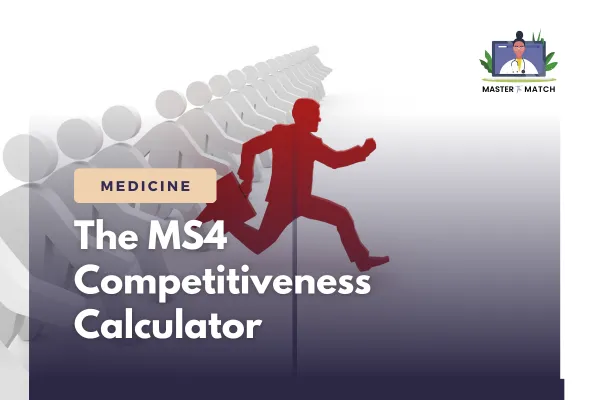Blog
Pearls from Kia Byrd, MD

The MS4 Competitiveness Calculator: Understanding Your Competitiveness
With the MS4 Competitiveness Calculator, learn how to excel in the residency application process. Understand your competitiveness and stand out with extracurricular activities and school ranking insights.

The MS4 Competitiveness Calculator: Understanding Your Competitiveness
Introduction:
Welcome back, future residents! In today's blog post, we delve into the intricacies of competing effectively during the residency application cycle. This blog also serves as an introduction to and the foundation for our comprehensive MS4 Competitiveness Calculator, the first step of our entire Master the Match program, designed to help you match at the top of your rank list in just 90 days.
In this blog, we'll explore how to interpret your stats, identify any gaps in your application, and understand your standing relative to other medical students.

With that said, here are the things you HAVE TO KNOW when assessing your residency application competitiveness! 👊
Understanding Your Stats
One of the biggest challenges for applicants is deciphering which stats hold the most weight. Is it USMLE scores? Grades? The secret of the residency application process is understanding that defining competitiveness is a nuanced blend of various factors. Our Competitiveness Calculator aims to help you understand the significance of your USMLE scores and quantitative metrics.
However, there are hurdles to overcome. Each residency program may assign different weights to various metrics, and some aspects of your metrics may be outside of your control, such as the grading policies at your medical school. Additionally, quantitative metrics alone may not fully capture your essence as an applicant.
To navigate these challenges, our MS4 Competitiveness Calculator provides context for your quantitative metrics while also acknowledging the importance of other qualitative characteristics that make you stand out.
MS4 Competitiveness Calculator: Action Steps

To get a broad understanding of how competitive your application may be relative to other applicants, follow these action steps:
Understand the weight of your USMLE scores: Research the average USMLE scores in your specialty to gauge where you stand.
Review your preclinical and clinical performance: Evaluate how your grades compare to those of your peers at your medical school in core rotations and electives.
Know how your medical school ranks: Determine your medical school's national ranking and understand its reputation.
By completing these steps and understanding the nuances of what residency programs may value most in applicants, you'll gain valuable insights into your application metrics and how they compare to those of other applicants.
A Note on Understanding Your Medical School's Ranking

Knowing your medical school's ranking can have a significant impact on your application strategy. A medical school's ranking can influence how program directors perceive your application and may affect your chances of securing interviews.
Understanding where your medical school stands can help you tailor your application to highlight the strengths of your institution. For example, if your medical school is ranked highly in a particular specialty, you may want to emphasize your training and experiences in that area. Additionally, knowing your medical school's ranking can help you set realistic expectations for the application process and identify areas where you may need to strengthen your application. To research and understand your medical school's ranking, you can visit websites such as the US News and World Report's Best Medical Schools ranking. These rankings are based on factors such as research activity, student selectivity, and faculty resources, and can provide valuable insights into the strengths of your medical school.
Overcoming Challenges

Navigating the residency application process can be daunting, with applicants facing a myriad of challenges along the way. One major challenge is the pressure to excel in multiple areas, from achieving high USMLE scores to maintaining outstanding grades and engaging in meaningful extracurricular activities. The competitiveness of certain specialties adds another layer of complexity, as applicants often find themselves vying for a limited number of spots with highly qualified candidates. Additionally, the stress of the application process itself can take a toll, with applicants feeling overwhelmed by the sheer volume of applications and the need to constantly prove their worth.
Our program addresses these challenges by providing a structured approach to the application process, helping applicants prioritize their efforts and focus on the areas that matter most. Through personalized guidance and comprehensive resources, we empower applicants to navigate the application process with confidence and maximize their chances of matching at their desired program.
Real-Life Examples
To illustrate the impact of your stats, consider these examples from recent residency application cycles:
Applicant A had a Step 2 score of 240 and ranked in the third quartile of their medical school based on grades, receiving interview invites from 22% of programs applied to.
Applicant B also had a Step 1 score of 240 but ranked in the first quartile, receiving interview invites from 74% of programs applied to.
Similarly, consider the case of two applicants with similar step 1 and step 2 scores:
Applicant A had a Step 2 score of 250 and attended a top 25 medical school. She received interviews from 56% of programs.
Applicant B also had a Step 2 score of 250 and attended a mid-tier medical school. She received interviews from 38% of programs.
These examples highlight the importance of not only your stats but also the reputation and ranking of your medical school in influencing your application's competitiveness.
The Role of Extracurricular Activities in Assessing Competitiveness

Extracurricular activities also play a crucial role in enhancing an applicant's competitiveness and demonstrating their commitment to the field of medicine. Engaging in activities such as research projects, volunteer work, and leadership roles can showcase a candidate's dedication and passion for their chosen specialty. These activities not only demonstrate a candidate's ability to balance multiple responsibilities but also highlight their initiative and drive to go above and beyond the basic requirements.
Participating in research projects, for example, demonstrates a candidate's interest in advancing medical knowledge and their willingness to engage in scholarly activities outside of the classroom. This can be particularly impactful for specialties that value research and academic achievements. Similarly, volunteering in healthcare settings or community organizations showcases a candidate's commitment to serving others and their ability to work effectively in a team-based environment.
Furthermore, holding leadership roles in extracurricular activities can demonstrate a candidate's ability to take on responsibilities, lead a team, and make decisions under pressure. These skills are highly valued in residency programs, as they indicate a candidate's potential to excel in a clinical setting and contribute positively to a residency program's culture.
When applying to residency programs, it is essential to showcase these extracurricular activities in your application. Highlighting your involvement in research, volunteer work, and leadership roles can set you apart from other applicants and demonstrate your well-roundedness as a candidate. By showcasing these activities, you not only demonstrate your commitment to the field but also provide program directors with a glimpse into your personality, values, and dedication to becoming an exceptional physician.
Conclusion
In conclusion, by understanding how you stack up against other applicants and how programs assess competitiveness, you gain a solid foundation for navigating the residency application process. By understanding the weight of your stats, reviewing your clinical performance, and knowing your medical school's ranking, you'll be better equipped to compete effectively. Master the Match provides a comprehensive assessment tool called the MS4 Competitiveness Calculator that takes all of the guesswork out of understanding exactly what quantitative metrics residency programs find important.
Remember, understanding your competitiveness is just the beginning. To fully prepare for the residency application cycle and maximize your competitiveness, consider enrolling in our Master the Match Deluxe course. Don't wait – sign up today and take the first step towards matching at the top of your rank list.
Stay tuned for more advice to guide you through every stage of the residency application cycle.
Ready to Elevate Your Residency Application Game?
Dive deeper into mastering the match with our online course, "Master the Match." Explore exclusive insights and strategies to boost your competitiveness. Click here to access our MS4 Competitiveness Calculator – your key to unlocking residency success. Don't miss out – invest in your future today!

Get FREE Tools & Tips
Get all of my best tips, articles, calculators, and strategies to thrive in Medical School and Beyond! Click the link >>
100% free of charge!
Copyright 2025 | Kia Byrd MD | All rights reserved. Privacy Policy & Terms and Conditions

